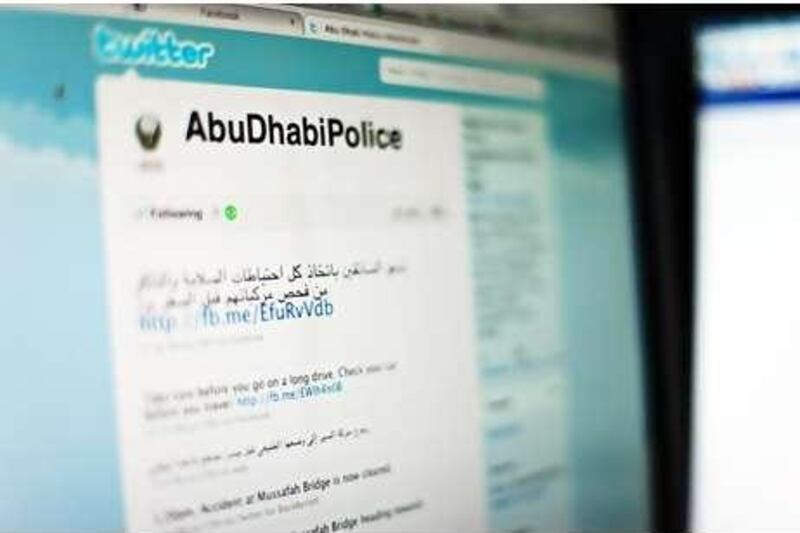ABU DHABI // Police in Abu Dhabi have already used a Formula One car, a custom-made motorbike and a Facebook page to spread their message to the youth. Now they are on Twitter. "We are always looking at the methods that the youth and public use," said First Lt Majed al Marzouqi. "We found that Twitter is the fastest way to reach people."
The idea of creating a Twitter presence was the brainchild of Lt al Marzouqi, the chief of media studies and security coordination at Abu Dhabi Police (ADP), who manages the team posting the 140 character updates on behalf of the force. He said the site commands the second highest number of users for a social network in the UAE after Facebook, making it a vital outlet for police updates. The ADP Twitter updates are part of an expanding online presence for the capital's law enforcement, whose Facebook updates include road safety tips, details of traffic jams, car accidents and visibility issues.
"12.15pm. Accident before Mussafah Bridge heading towards Abu Dhabi. Slight delays," read one. The force posts messages under the username AbuDhabiPolice. "I'm proud to see the government catching up," said Mohammad Zaher, 28, a blogger and social media manager who follows ADP on Twitter. "It's taking people seriously." The Twitter account was launched in May, with regular English updates appearing in early June, and bilingual posts in July.
As of yesterday there were 226 followers, with a specially appointed team tasked with responding to comments and questions. "We reply to people's questions and comments in private," said Lt al Marzouqi. "Every message we post, we get replies. Some of the replies were: 'Oh my God, Abu Dhabi police is now on Twitter!' "When we post a message on an accident, we get inquiries on the location and casualties, to which we also respond."
Mr Zaher said there should be more interaction, with the team following users so that private inquiries can be sent. Twitter users cannot send private messages to someone who is not signed up as one of their "followers". He also suggested that post should give the number to call for those involved in an accident, or those registering for a licence. Twitter could be enlisted to help spread the force's message, said Lt al Marzouqi. Often, those following the police posts - though their numbers are not high - resend ADP's messages, broadcasting them to a wider audience.
"It puts pressure on the government or companies in terms of replying to people," said Mr Zaher. "It makes things public." The police must be ready to reply to queries on Twitter immediately, as users were capable of disseminating information swiftly, he said. A recent survey of the government websites found widespread communications breakdowns, including non-functioning links, bounced emails, and compatibility issues with some Arabic and English language pages.
Mr Zaher said he hoped other government bodies followed suit. "From the depth of my heart, I would like to see a Dubai Police Twitter account," he said. @Email:hdajani@thenational.ae kshaheen@thenational.ae







